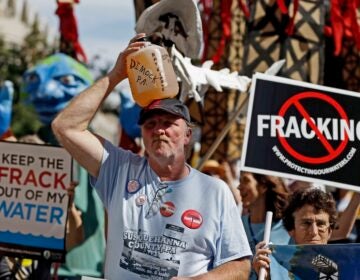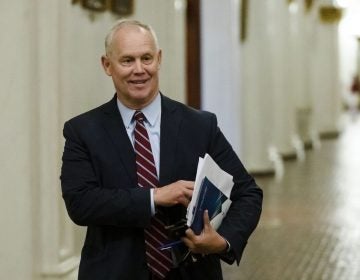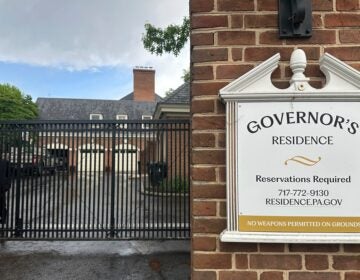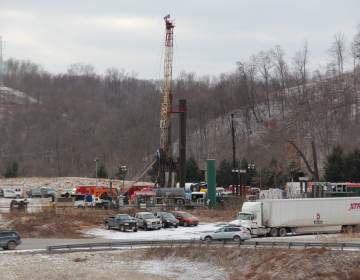Damning report on Pa.’s failure to protect residents from fracking unlikely to result in major reform
Despite the two-year effort to bring these findings to light, it’s unclear if the grand jury report will bring about meaningful reforms sought by those who say they’ve harmed.
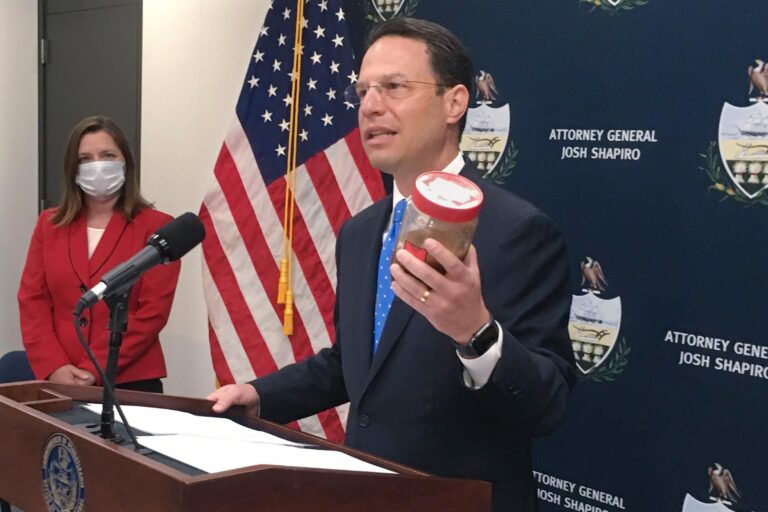
Pennsylvania Attorney General Josh Shapiro speaks at a press conference. (Mark Scolforo/AP)
This story originally appeared on Spotlight PA.
___
Spotlight PA is an independent, nonpartisan newsroom powered by The Philadelphia Inquirer in partnership with the Pittsburgh Post-Gazette and PennLive/Patriot-News. Sign up for our free weekly newsletter.
The recent findings of a massive grand jury investigation into the state’s failure to protect communities from unconventional oil and gas development, known as fracking, were damning, and lent official credence to problems many residents have decried for years.
The long-anticipated report outlined explicit ways in which the Department of Environmental Protection and the Department of Health turned a blind eye to the snowballing effects of fracking on Pennsylvania’s residents and skirted constitutional obligations to protect the environment.
State officials testified about directives to ignore health concerns and practices that glossed over the harm the public experienced, effectively gaslighting residents whose tap water appeared brown or experienced rashes when they showered, but were told nothing was wrong.
The testimony also revealed how officials deferred to the industry and poorly tracked complaints, and how state workers failed to properly test potentially tainted air and water.
“More than anything, it is the government’s willingness to use the tools at its disposal to protect people,” Alex Bomstein, an attorney for Clean Air Council, said. “That’s what needs to change.”
Despite the two-year effort to bring these findings to light — encompassing 287 hours of testimony before the grand jury, resulting in a 243-page report — it’s unclear if the grand jury’s report will bring about actual, meaningful reforms sought by those who say they’ve been harmed.
Several of the report’s recommendations address problems previously raised by advocates in legal cases and unsuccessful pushes for new legislation to better account for the health and environmental impacts of fracking. Some lawmakers said the proposals overreach and are an ineffective way to change policy.
State agencies, meanwhile, dismissed the report outright, calling the recommendations unnecessary and crafted by a group of people unqualified to understand environmental law. Many of the issues raised were outdated, they said, and already addressed.
“The report fails as an exposé of a government agency ignoring its statutory duties,” attorneys for the state Department of Environmental Protection wrote in response to the report. It provides “Pennsylvania’s citizens with a false picture of [the agency] and encourage[s] them to believe their government is incompetent and/or places the economic well-being of various corporations above their health and well-being and that of the commonwealth’s public natural resources.”
Attorney General Josh Shapiro said the report is not the end of the investigation. Roughly a week prior to the report’s release, the grand jury issued indictments against the oil and gas companies Cabot Oil & Gas and Range Resources, alleging they committed environmental crimes, including polluting the local water supply with methane — in one case causing a well to explode — and negligent oversight of well sites, as well as knowingly covering up problems.
Still, many who have called for better industry oversight and regulation questioned the absence of any criminal charges against state officials and the lack of focus on Gov. Tom Wolf, who has overseen the agencies criticized by the grand jury report for five years. Others say the report’s ineffectualness is evident in the state’s current behavior. Even after the indictments, the Department of Environmental Protection issued permits to the companies charged.
John Smith, a Washington County attorney who has represented numerous landowners against gas companies, said the grand jury report at least provides “some documentation” that validates what people in his community have long known: Laws are inadequate and the state will not step in to protect residents against oil and gas development.
“There is not an appetite to enforce anything with any teeth,” he said.
Smith faulted the grand jury for not going so far as to say who in the administration was responsible for failures within the agency, or recommending punishment. The report instead endorsed stronger regulations and disclosure requirements, as well as steps to prevent a revolving door between state agencies and industry.
But Smith and others argue some of these recommendations don’t address foundational problems — like a lack of funding or the cozy relationships between those in power and industry players — that have prevented existing laws from being enforced or improved.
So far, fallout from the report has amounted to finger-pointing and denial.
The industry has said it is a good neighbor and respects the environment and public health. The state has not only denied any wrongdoing, but said the report is inaccurate. The Department of Environmental Protection, the Department of Health, and Wolf’s office said the problems identified by the grand jury were largely issues of past administrations, and current regulatory efforts are protective.
The state also criticized the grand jury as a lay body, unable to grasp the nuance of environmental law. It said a lack of names, dates, and detailed identifiers undermined any evidence, and even raised the possibility photographs of contaminated water, for example, had been doctored.
The report paints a “false picture” of the Department of Environmental Protection and “also fails as a meaningful tool for improving the regulation of the conventional gas industry, because the report is not at all informed by the applicable law or facts,” attorneys for the state wrote in a response.
To David Brown, a public health scientist with the Environmental Health Project, which assists communities where oil and gas development is prevalent, the state’s defense is just as concerning as the grand jury’s findings. What does it mean if the state has been doing everything in its power to protect the public?
“If both agencies are doing their jobs to the maximum effect and the health effects are still occurring, then we have a serious problem because they are essentially saying it [the oil and gas industry] can’t be regulated,” he said.
Brown said he put the report down and thought, “How are we ever going to get out of this mess?”
The Office of the Attorney General said the Department of Environmental Protection was given a full day to present testimony to the grand jury and allowed to provide extensive written evidence.
“After all the evidence was heard … this was [the grand jury’s] conclusion — the giant fracking companies were given free passes by unprepared agencies, and the public was harmed,” said Jacklin Rhoads, a spokesperson for Shapiro.
Both the state and lawmakers have seized on the anonymity and lack of specificity in the report, which the Attorney General’s Office said was necessary to protect the privacy of those who testified.
Republican lawmakers said environmental regulations are already more than rigorous. Sen. Gene Yaw (R., Lycoming), chair of the Senate Environmental Resources and Energy Committee, said existing oversight is extensive, and to further regulate the industry would only drive it out of the state.
Democrats, meanwhile, said recommendations in the report were identified years ago, but cannot be addressed without the political will to pass bills that seek stronger environmental protections. Others said the agencies have done everything they can, but have been waylaid by a deliberate dismantling, leaving them short-staffed and poorly funded.
Rep. Greg Vitali (D., Delaware), minority chair of the House Environmental Resources and Energy Committee, called the report problematic and said he stood by the work of the Department of Environmental Protection. He said he’s fought to remedy some of the recommendations from the report, like requiring more distance between wells and homes, but has been stymied by GOP majorities in the legislature.
“These recommendations are all well and good,” he said, but “to enact these recommendations people who care about the environment have to win elections — simply to say this is what should be done is fine, but we have been trying to do it.”
Sen. Steve Santarsiero (D., Bucks), minority chair of the Senate’s environmental committee, said he and other lawmakers intend to introduce bills to address the recommendations, but would not say what or when. A spokesperson for Wolf said the governor would support additional legislative efforts.
“We are not going to let this report sit out there without some action being taken,” Santarsiero said.
But these words are empty to advocates like Craig Stevens, a landowner in Silver Lake Township, near Montrose in Susquehanna County, who watched oil and gas activity, and health problems in tandem, rip through the community.
He said that Yaw and Santarsiero don’t return his calls about industry problems, and that years-long pleas to Wolf and other state officials to look at the relationship between cancer and fracking have had little impact. Last year, the administration announced it would fund two studies into the potential health effects of fracking, including childhood cancer.
“The companies themselves are not to blame,” Stevens said. “Yes, they are the ones that did it, but this is a process problem.”
“It is the government that is doing this,” he said.
 100% ESSENTIAL: Spotlight PA relies on funding from foundations and readers like you who are committed to accountability journalism that gets results. If you value this reporting, please give a gift today at spotlightpa.org/donate.
100% ESSENTIAL: Spotlight PA relies on funding from foundations and readers like you who are committed to accountability journalism that gets results. If you value this reporting, please give a gift today at spotlightpa.org/donate.
WHYY is your source for fact-based, in-depth journalism and information. As a nonprofit organization, we rely on financial support from readers like you. Please give today.


